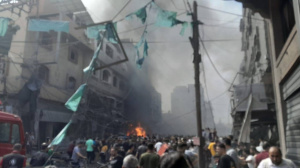For the past 48 hours, the Israeli military has carried out a relentless series of attacks against the civilian population in Gaza, destroying dozens of family homes, residential and commercial buildings—often without issuing precautionary warnings—and wiping out entire Palestinian families. The number of Palestinians killed or wounded and the scale of the buildings destroyed or damaged by Israeli attacks is so extensive that our field workers are struggling to compile comprehensive casualty figures.
On 9 October 2023, Yoav Gallant, Israel’s Minister of Defense, stated: "We are imposing a complete siege on [Gaza]. No electricity, no food, no water, no fuel – everything is closed. We are fighting human animals, and we act accordingly." This statement, that includes genocidal language, appears as an admission of intent to commit war crimes and other grave international crimes against the civilian population in the Gaza Strip.
Gaza has a civilian population of over two million Palestinians, half of whom are children. Imposing a total closure of the Strip amounts to a collective punishment of an unprecedented scale, which cannot be justified either legally or morally. All crossings between Gaza and Israel have been closed since Friday, 6 October. Since then, no people or goods have left or entered Gaza via Israel, including medical patients in need of urgent medical care unavailable in Gaza.
Sixteen years of Israeli closure and recurrent military attacks have shattered Gaza's welfare system and ability to meet the basic needs of the population, particularly health services. As a result, Gaza has become gradually reliant on humanitarian aid: in January 2023, the UN OCHA reported that 58 percent of Gaza Strip residents require humanitarian aid, and a large number of households are subjected to severe, extreme, or catastrophic conditions. Ninety-seven percent of water in Gaza is unfit for human consumption based on the standards of the World Health Organization.
The number of Palestinian deaths and injuries in the last 48 hours is so high that Gaza's crippled health system is barely able to cope with the influx of people needing treatment. Mahmoud Shalabi, the Gaza-based Senior Programme Manager for Medical Aid for Palestinians, said: “There were many dead bodies in the morgue and many medical staff were unable to cope with the huge influx of casualties they were receiving.” Currently, the only hospital in the Beit Hanoun area is out of service due to the repeated strikes that have made it impossible for ambulances to enter and exit the hospital.
Total warfare is absolutely prohibited under international humanitarian law. Article 54 of Additional Protocol I to the 1949 Geneva Conventions provides the absolute prohibition on starvation as a method of warfare, prohibiting combatants “to attack, destroy, remove or render useless objects indispensable to the survival of the civilian population, such as foodstuffs”. Rule 53 of the ICRC Customary International Law Database further cites the prohibition of starvation as a customary rule of international law. The deprivation of basic supplies necessary for the survival of the population, including food and clean water, may amount to a war crime under Article 8(2)(b)(xxv) and to a crime against humanity under Articles 7(1)(b), 7(2)(b), and 7(1)(k) of the Rome Statute of the International Criminal Court.
The call by Israel’s Minister of Defence to cut off food, water and basic supplies necessary for human survival in a besieged area under occupation and in a context of widespread and systematic attacks against the civilian population, may meet the threshold of ‘extermination’. This is the case where starvation is imposed as part of “a mass killing of members of a civilian population” according to the ICC’s Elements of Crimes.
Given complementary calls by Israel’s Prime Minister to reduce Gaza to “rubble”, such a widespread and systematic attack against the civilian population may amount to a crime against humanity, and is reminiscent of the ‘scorched earth’ policy prosecuted at Nuremberg. Further, the dehumanising language by Israel’s Minister of Defence, a senior ranking government minister, calling the Palestinian people “human animals” comprises a particularly egregious form of inciteful invective, employed to degrade and encourage the commission of international crimes.
This latest decision by the Israeli government requires the immediate and urgent intervention of the international community, which must compel Israel to fulfil its international legal obligations. It should also put the Office of the Prosecutor of the International Criminal Court on alert to an intent by Israel to incite and carry out the most heinous international crimes against civilians. We call on the international community to urgently intervene and ensure current commitments to allocate humanitarian funding are continued and protected for the survival of the civilian population in Gaza.


